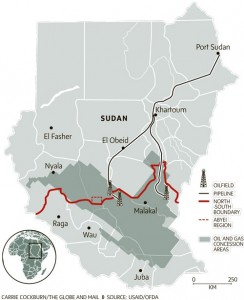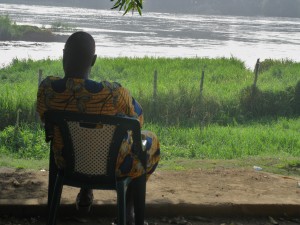Self-determination: some questions remain
It’s hard not to get caught up in the enthusiasm the people of Juba feel for the coming days. Tomorrow, Jubans and their neighbours throughout Southern Sudan begin voting in a referendum on splitting up Sudan. In a few months, if the polls are correct, Southern Sudanese will formally create a new country in Africa, the continent’s 55th independent state. Most people around Juba rejoice, and their joy is infectious.
But there are lingering questions.
One of them is oil, which I wrote about in a previous entry. Another is water.
The White Nile flows through Southern Sudan on its way from Uganda to the rest of the Sudan. Both Sudans, North and South, need its waters (to say nothing of Egypt farther north.) North of Khartoum, Sudan becomes very dry and, even with the river fortified at this point with waters from the Blue Nile flowing out of Ethiopia, the land needs the water of the White Nile.
Of course, a new southern Sudanese state will need water, as well, and the White Nile will be its principle source. But any attempt to dam the waters, or divert them (as was tried with the failed Jonglei canal), however, will surely cause tension between communities.
Another issue which nags is ethnicity and citizenship. How will so called “Arab Sudanese” be treated? Will “Arab Sudanese” living in the new state be entitled to citizenship? I can’t even get a clear answer on whether these people – many of whom have lived for decades in Southern Sudan – are eligible to vote in the referendum. The most common response I get is that they most likely won’t want to. Why? I can’t really explain.
I don’t even know what to call these folks. We who live outside Sudan hold linguistic olympics to describe the people of Sudan, generally. For example, we describe northerners as “arabized” or “Arab-speaking” or, in the case of the people of the South of Sudan, either “Black Africans”, their various tribal names, ie., Dinka or Nuer, or “the non-Muslim South”.
I went to listen to Thabo Mbeki speak at the university here the other day and he referred to northerners as “Arab Africans”, which received polite applause from the mostly “Black African” audience.
One thing I notice is that the Sudanese church leaders on our delegation haven’t the same difficulty naming the people of the North. They are “Arabs”. Plain and simple. Perhaps it’s just a shorthand. Or perhaps it’s a way of grouping their perceived oppressor into one easy category. Regardless of what you label these people, however, there are many of them living in Southern Sudan (just as there are many Southern Sudanese living in Khartoum), and their rights will need protecting, too.
And finally there is Abyei, a region rich in oil and situated right along the proposed border, inhabited by the southern Dinka Ngok people but with lands used by the northern nomadic Misseriya tribe for grazing their cattle herds. Frequently, the Dinka have come under attack from Misseriya militias (reportedly, armed by Khartoum). But the Misseriya see themselves as victims, too, and they have a case.
Under the 2005 Comprehensive Peace Agreement (CPA) which brought the civil war to an end, two referenda were agreed: one for southern secession or unity and the other to give Abyei the opportunity to choose to be part of the North or the South. This second referendum has been postponed.
There seems to be no doubt that the Dinka Ngok would vote for the South but, under the terms of the Peace Agreement, the Misseriya were not given the vote and they feel aggrieved.
So, while the euphoria continues to gain strength around Juba for what people perceive as the inevitable outcome of the referendum, there are still many issues which will demand serious attention after the polls close next Saturday. If the South votes for separation, there is going to be a massive challenge keeping the parties (including the international community) focused on resolving these outstanding issues.
——————————————-
John Lewis, KAIROS International Human Rights Coordinator, accredited by the South Sudan Referendum Commission, is currently in South Sudan on behalf of the Canadian churches monitoring the self-determination referendum called for in the 2005 Comprehensive Peace Agreement ending 20 years of North-South civil war.









